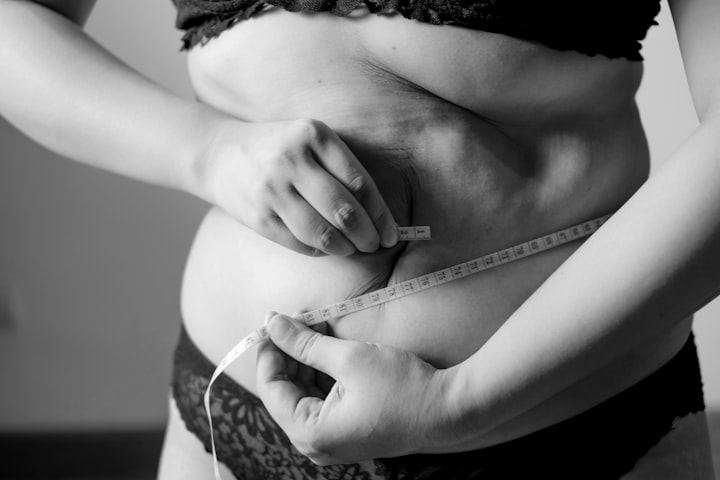Why Am I Gaining Weight When I Eat Healthy?
You're not alone if you're trying to eat healthier to lose weight but the scale isn't going down.
Successful weight reduction depends on a variety of circumstances, much like most other aspects of life. Thankfully, most of these variables are under our control, but others are not.
Here are some things to think about and address to help you reach your objectives if you're having trouble losing weight or keeping it off while eating a healthy diet.
Your perception of what constitutes a healthy diet may be distorted.
There are many false assumptions about what constitutes a healthy diet. Many consumers believe that the fast food restaurants or franchises they frequent offer excellent nutritional alternatives. Are meals actually nutritious when they are laden with salt, sugar, and sauces and dressings?
The United States Department of Agriculture (USDA) recommends that fruit and vegetables make up at least half of your typical meal plate. Lean meats or other lean protein sources like nuts, beans, or tofu should make up the remaining half of the diet.
You may be eating excessively.
Even if you're eating healthy meals to reach your goal weight or choosing salads and grilled dishes while dining out, overindulging in these foods might undermine your efforts. Why? Since the 1970s, portion sizes have substantially increased, making it difficult to determine just how much food constitutes a healthy amount.
Use a portion or split plate while cooking and dining at home if you struggle with portion distortion. Take the time to precisely measure the foods you produce before adding them to your plate. Choose meals at restaurants that are mostly composed of fruits, vegetables, and lean, grilled meats, and consume around half of the servings that are presented to you.
You May Be Eating Insufficiently
You might believe that eating smaller quantities than what is advised would help you lose weight more quickly, but doing so actually encourages your body to save energy by lowering the amount of calories you burn. The term "starvation mode" refers to this occurrence, in which your body instinctively holds onto whatever calories it consumes even when you are not particularly hungry in order to keep your energy balance.
Eating too little might sometimes make you so hungry that you skip meals and snacks you had planned or choose unhealthy foods that aren't good for losing weight. What can you do, then?
First, be sure to feed your body with nutritious, well-balanced meals. Next, consume natural or nutrient-rich snacks that not only provide you energy but also nourish your body to control hunger and lessen the impulse to overeat between meals.
You Might Be Holding Water
Since water makes up the majority of the human body, it seems sense that our bodies occasionally retain surplus water. The most prevalent causes of water retention include overconsumption of salt and some processed foods, but other factors, including prolonged standing or sitting, hormonal changes related to your menstrual cycle, and even some medications, can also contribute to increased water retention.
The most effective method to Lose 10 Kg Fast
Reduce Your Sodium Intake
Reduce your salt consumption for the easiest approach to reduce extra water weight. We advise you to examine food labels when you buy and steer clear of goods that are high in sodium as well as minimizing the amount of salt you add to your food at the table. The most popular high-sodium foods are salted almonds, cold cuts, bacon, sausages, and hot dogs.
Eat Magnesium-Rich Foods
Increase your consumption of foods high in magnesium, vitamin B6, and potassium in addition to cutting back on high-sodium meals, since these nutrients support a number of body processes and have been shown to help decrease fluid retention. So choose meals rich in these necessary nutrients, such as leafy greens, whole grains, avocados, tomatoes, bananas, and other such items.
Consume A Lot of Water
Yes, it is accurate. If you're retaining water, you may need to increase your water intake. The brain activates the body's thirst mechanism when the body is dehydrated, which many individuals mistake for hunger. If your water intake and outflow are not balanced, you risk becoming dehydrated, which may cause your body to retain more water.
Fortunately, a lot of our nutritious meals include water, and even other beverages like coffee and tea may help you get the hydration your body needs. You should be aware of the color of your urine. If your urine is dark orange or deep yellow, you are dehydrated. It should just be slightly yellow. We recommend eight 8-oz glasses of water each day as a cautious quantity.
You Aren't Sleeping Enough
Your body tends to gravitate toward junk foods rather than the nutritious meals and snacks you have planned when you don't get enough sleep. In fact, studies suggest that receiving less than five hours a night increases the risk of weight gain. So, to achieve your best level of health and wellbeing as well as to support your weight reduction efforts, make sure you receive between 7-9 hours of sleep every night.
You're Feeling Stressed
weight-gain-casused-by-stress Everyone is, right? Regrettably, persistent stress has been implicated in impeding weight reduction. Why? First off, most "comfort foods" that individuals frequently eat during stressful times are harmful. Additionally, the hormone cortisol, which your body produces when you're stressed, might make your body hold onto fat, particularly the belly fat that most people want to lose.
Instead of turning to desserts, chips, or other high-carbohydrate, high-fat items to relieve your stress, try exercising, practicing yoga, reading, or engaging in other relaxing or enriching activities.
You've Reached 40
There are several things that make it more difficult to lose weight if you're over 40, such as:
- Hormones - It goes without saying that our hormones are one of the key reasons why we can't lose weight or experience weight gain. Women's bodies start producing less estrogen in their mid-30s, which causes our bodies' fat to concentrate in the midsection of our bodies.
- Lower Metabolism - After the age of 40, both the basal metabolic rate (BMR) and the amount of energy you expend when exercising drop. Some scientists claim that beyond age 40, metabolism might slow by around 5% every decade. This indicates that every decade, you require 60–100 less calories per day. You'll likely require even fewer calories if you lead a more sedentary lifestyle, consume more calories than you burn, and experience frequent stress. Consider this, then.
- Genetics - Research has pinpointed the precise genes that control how many fat cells we have and where they are stored. Looking at your parents and other family members will help you determine where your family prefers to store excess fat, even if this isn't something we can really alter.
- Muscle Loss - Along with our metabolisms slowing down as we age, our bodies also start to lose muscle starting in our 40s, and this loss becomes steadily worse with each passing decade. While some experts contend that our muscles' motor units deteriorate with age, the main contributor to muscle loss is inactivity, making exercise a daily need to stop muscle loss.
We take the time to carefully evaluate your wellness goals to ensure that you're on the right track because we know how discouraging it can be for anyone who is eating healthily and exercising frequently to not see their hard work translating to weight loss.
The most effective method to Lose 10 Kg Fast
About the Creator
Januka Rathnayaka
Exercising regularly, every day if possible, is the single most important thing you can do for your health.







Comments
There are no comments for this story
Be the first to respond and start the conversation.